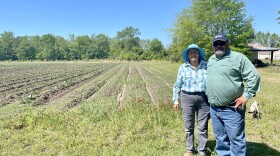-
Chatham County created a farmland preservation plan in 2010. Since then, the county's population has grown by more than 20 percent.
-
A surge of North Carolinians are moving to rural areas to retire or to escape high housing costs in the Triangle. That's prompted some rural counties to find ways of both welcoming and preparing new residents for life alongside working farms.
-
Wake County wants to save its farmland. A new program makes conservation more viable for landowners.In the last nine years, Wake County lost nearly 20% of its farm and forest land.
-
Lake Mattamuskeet is infested with an invasive species that has destroyed underwater grasses and decreased water quality.
-
Researchers focused the study on a pest that typically ravages corn, cotton, soybeans, peppers, tomatoes and other vegetable crops.
-
The Biden Administration is looking to update a century-old federal law that would affect North Carolina's poultry industry.
-
Climatologists say pop-up showers this weekend and Gulf moisture later in the month could bring some relief.
-
Climate change is already affecting food security around the globe, and that’s only expected to worsen as the global average temperature increases. But there are climate-resilient practices North Carolina farmers can use to protect their crops — and lower their carbon emissions.
-
A Black farming incubator in Edgecombe County wants to help other aspiring Black farmers learn about agriculture.
-
The long term effects of climate change can be hard to identify in day-to-day life. But ����app Youth Reporter Priyanka Rathnam, from Raleigh, North Carolina, reports on how it's changed her family's access to some mealtime favorites, and how some local farmers are combatting the crisis.
Play Live Radio
Next Up:
0:00
0:00
Available On Air Stations








